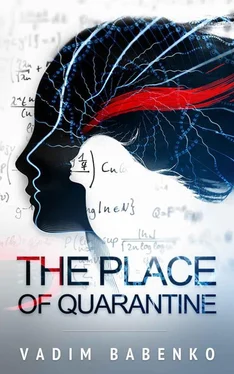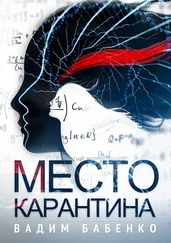He paused, chewing his lips as usual, and said, rather reluctantly, “My answer will surprise you. On the whole, it seems to me this knowledge makes a person better. I’ve thought about it; I have to admit – I’ve even written something on this matter.”
“Makes them better – in what way?” I persisted.
“I repeat: on the whole ,” said Nestor with emphasis. “Because there are ‘believers ’and there are ‘thinkers’ – and nothing can change the views and minds of the mass of believers; they’re hopeless. And those who dare to produce a thought suddenly understand: you cannot run away from anything – ever. The B Object will not allow it, so it’s better not to spend the time allotted to you by making things worse… And if there’s more of this time than was commonly believed, it should only increase your focus, your sense of responsibility.”
“Is it that simple?” I asked incredulously.
“What is there to complicate in this instance?” Nestor shrugged. “In your world, you tried to refine human nature by all possible means, and nothing worked – but give that human the knowledge that his existence continues, that everything is not in vain… Give him the confidence that this knowledge is not a trick, and he discovers amazing resources in himself. He begins to look at things differently – he may even sense some sort of connection with the universe, albeit only intuitively, without having the first idea about the field of the conscions. He even feels an interdependence – of destinies, lives, of everyone with everyone – despite never hearing about the Cloud and the clustering of Objects. As a result, he, all of a sudden, starts to believe that by giving and not consuming, he generates something real, an almost material outgoing flow that somehow affects the lives of others, adding significance and substance to them. His tiny attempts pushing others to make their own – and all this, by the way, is perceived without any mathematics. It sounds like a naive humanism, but this naivety suddenly gains an indulgence, an undeniable meaning…”
“Well, but still…” I interrupted. “A complication does suggest itself here – I mean nonlinearity, an explicit feedback. Fate first beckons you with a carrot, then teases you with a red rag, and you rush off – chasing after or intersecting, colliding. It lures you into a trap, where there is nothing but memory and pain – and immediately switches the means and the target, forcing you to move on… Nonlinear dynamics in its pure form, isn’t that so?”
“What else is new?” Nestor snorted. “It’s as clear as day: the feedback cycle – from hopelessness to an illusory goal, from seeming chance to one’s own, so-called personal, unswerving aspiration… One can also speculate with regards to B Objects – to call on all those ‘accidental’ acquaintances to answer. Many of them, sooner or later, become unnecessary for your conscion vortex, not being able to enrich it anymore – and you free yourself, push them away. Yes, you push them away – or maybe not…”
Nestor paused, then waved his hand and added a little wearily, “And of course, speaking about meanings, all kinds of toys, treasure chests of riches, are left behind the brackets when going from one life to another. It also helps to add to the ranks – if you look from the side of the minority – or, if to glance from the other side, drop out of the ranks. Break out of the matrix, from unnamed but very firm agreements with society, from the stereotypes imposed by it. Human nature cannot be changed rapidly – yet, here, in our world, the power of public opinion is weaker. It’s no longer so obvious what to consider as ‘success’ – that’s a step forward, don’t you agree? Some other things get transformed too – for instance, fears. It is fearful to accumulate disappointments and defeats; it’s terrible to be a loser from one life to the next. Or to know that you are not doing what you do best – even if nobody believes in what you do best, even if you are laughed at by your own family. Well and…” Nestor moved forward, his voice somehow becoming thinner, his chin more angular. “And the fear of death: it becomes completely different from what it used to seem. Now it is nothing more than the sublimation of the two other things: the fear of idling and the fear of losing. And everything is intertwined: you aspire, they expect something from you, then they make fun of you, not really grasping what you have managed to achieve. And you accept it as the price of freedom from one of your fears – and immediately remember the second one and think with yearning: where is she, the one who cannot love you with all her heart, believing that only those who are near can be loved… I guess I answered your question? End of the session. The next answer is yours!”
I nodded at the blank screen, got up, walked over to the window. Looked at my reflection in the glass for a long time, thinking – and what is my own fear? Afterward, despite the late hour, I went into the living room, hoping to see Elsa. The room was empty, however; then I brought a clean notebook and pencil from the bedroom and sat down at the dining table. I began to write – and there were no equations, no formulas in my writing. I didn’t think about my theories anymore – just as I didn’t care what was going to happen to me next.
I was repeatedly crossing out what I had written, crumpling up the pages. I was wrinkling my forehead and starting again. And so it went on until late into the night.
The morning found me half asleep and lethargic. I went to the bathroom, washed my face. Then I rotated my arms, even did a few stretches and squats. My phantom body responded as if it really had been refreshed; my head became clearer. I listened attentively to my inner self. There, inside, everything remained the same. My determination had not gone away.
I dressed carefully and went into the living room. There, I Immediately saw Elsa and could not restrain a surprised exclamation: her appearance had changed. Her dark-blonde hair had turned a bright red, and it altered everything – her smile, the expression of her face and her eyes.
“I just thought you might like it,” she said, a little embarrassed. “I could have just had a streak like hers, but I decided to be original. And besides, a whole head of hair is more than a single streak…”
She walked around the room, then opened the refrigerator, took out a carton of milk and smiled, “It was not easy figuring out how to do the dyeing. I pestered my Nestor; at first, he refused to tell me, but then he relented and gave me precise instructions. He probably thought I was doing it for him. I, of course, didn’t mention that’s not exactly true. It wouldn’t be wise to worsen our relations even more. Will you have eggs or just coffee? For some reason, I’m not hungry at all.”
“Wait a minute!” I exclaimed. “Now I know how it should be…”
I ran to the bedroom, grabbed my notebook and crossed out the first line. “Now I know,” I repeated to myself, writing another one in its place, hiding it from Elsa’s view with my shoulder. And then I passed the notebook to her: “Here, I also tried to do something for you. Of course, my effort didn’t come out as well as yours…”
Elsa quietly read aloud, “‘One day I stole a red squirrel…’” and looked up at me, “Is this a poem? To me?”
I nodded, now tormented by awkwardness myself. Turning to the window, I mumbled, “Sorry, it has no rhyme.”
Elsa read the rest in silence, came up to me, touched my hand and said, “I have never seen a more beautiful poem!”
I was nearly as thrilled to hear this as when Nestor told me about the universality of my “face of thought.”
Читать дальше












